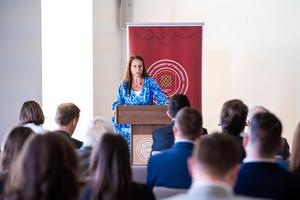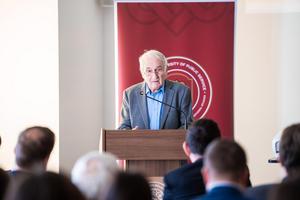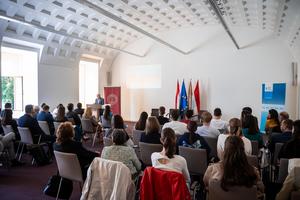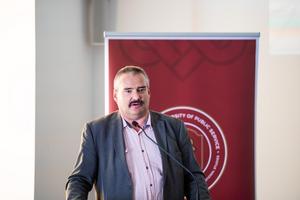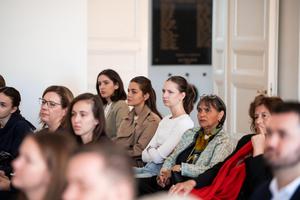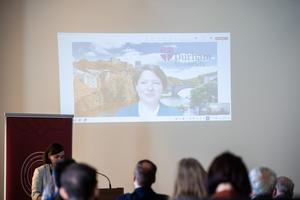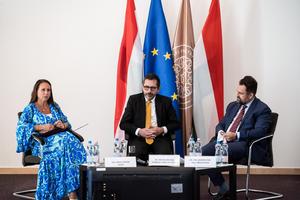The Faculty of Public Governance and International Studies of the Ludovika University of Public Service (LUPS) organized a scientific conference on September 17 in the Zrínyi Miklós Hall of the university to mark the 50th anniversary of the signing of the Helsinki Final Act. The 1975 Helsinki Conference, which resulted in the Final Act, was one of the most significant diplomatic events of the Cold War era. It launched the process of détente, during which the United States, the Soviet Union, and their allies increasingly sought to ease military tensions in Europe and improve their relations.
In her opening remarks, Réka Varga, Dean of the Faculty, recalled the historical role of the Helsinki Final Act, which, even in the midst of the Cold War, stood for dialogue, trust, and shared responsibility. She emphasized that the aim of the conference was not only to revisit the past but also to interpret current challenges in the light of Helsinki values. “Fifty years ago, it was explicitly declared that political and legal disputes must be resolved without the use of force,” she stressed, adding that the spirit of the Final Act remains a valid guide for sustainable peace, justice, and prosperity.
André Erdős, Vice President of the Hungarian Atlantic Council, recalled the birth of the Helsinki Process, which, during the period of Cold War division, sought to ease East–West tensions. He added that the document had a particularly significant impact in Eastern Europe, contributing to the strengthening of civil society and the regime change.
Iván Halász, Head of the Department of Constitutional Law and Comparative Public Law at LUPS, analyzed in detail the historical background of the Helsinki Final Act and highlighted its human rights dimension. He reminded the audience that the initiative came from the Soviet Union and its allies, whose main goal was to consolidate post-war European borders and secure the status quo. The US reacted cautiously at first, fearing it would legitimize Soviet influence, especially regarding the Baltic states. However, the Americans eventually decided to participate and strongly emphasized human rights, freedom of the press and religion, and free movement during the negotiations.
Katalin Sulyok, Associate Professor at Durham University, joined the event online. Her lecture addressed the issue of responsibility toward future generations, particularly in the context of environmental and climate protection. She pointed out that the legal concept of responsibility toward future generations first appeared in the 1972 Stockholm Declaration and then in the environmental section of the 1975 Helsinki Final Act. She added that in judicial practice, particularly in human rights cases, the protection of future generations is gaining prominence: for example, the German Constitutional Court has ruled that fundamental rights could be violated in the future if emissions are not reduced, thus obliging the state to protect future generations.
Following the lectures, panel discussions took place. The first session, titled New Trends in International Dispute Settlement, was moderated by Dean Réka Varga. Participants included Metod Špaček, former Chief of Staff of the Office of the President of the Slovak Republic, and Pál Sonnevend, Professor and Head of Department at the Faculty of Law of Eötvös Loránd University (ELTE). The discussion focused primarily on the legacy of the Helsinki Final Act, the development of international law, and the practice of the International Court of Justice. Speakers also shared personal experiences: one recalled living through the changes of the 1970s as part of the “Helsinki generation,” which contributed to the strengthening of civil society and regime change in Eastern Europe. They highlighted that the Helsinki Process influenced international law and responsibility, and new trends in international courts were also discussed.
The second session focused on the impact of the Helsinki Final Act’s principles on space law. Three experts shared their insights: Rosanna Hoffmann, Legal and Programme Officer at the United Nations Office for Outer Space Affairs (UNOOSA); Balázs Bartóki-Gönczy, Vice Dean for Science of the Faculty of Public Governance and International Studies at LUPS and Head of the Institute for Telecommunications, Aviation and Space Law; and Gábor Sulyok, Professor at Széchenyi István University. The session was chaired by Szilvia Balázs, Head of Department at the Ministry of Foreign Affairs and Trade. Hoffmann emphasized that the principles of peaceful cooperation set out in the Helsinki Final Act remain relevant today—even in new fields such as space exploration and use. The work of UNOOSA demonstrates that the international community is capable of consensus and common rules, even as political and technological challenges grow.
Balázs Bartóki-Gönczy discussed current international space law issues, noting that while outer space is not a “militarized zone,” security aspects such as surveillance and data trade are becoming increasingly significant. He added that legal disputes have already emerged regarding space mining and the exploitation of celestial bodies’ resources. In his presentation, Gábor Sulyok emphasized that the history of space governance dates back to the post-World War II period and was strongly influenced by the Cold War. The space age began in 1957 with the launch of Sputnik. In 1962, the UN General Assembly adopted the fundamental principles of outer space, emphasizing peace, equality, and shared responsibility, followed in 1967 by the legally binding Outer Space Treaty, which ushered in a golden age. After 1979, however, international developments in space law slowed due to the Cold War and geopolitical tensions.
The third session addressed the intersection of human rights and climate protection. Moderated by Ágnes Váradi, Associate Professor at LUPS, the session featured three presentations. Marcel Szabó, Judge of the Constitutional Court and Professor at Pázmány Péter Catholic University, examined the rights of future generations and the issue of environmental justice, emphasizing that the long-term consequences of the climate crisis particularly affect future generations, making sustainability and fair burden-sharing fundamental human rights issues. Ágnes Lux, Associate Professor at the Faculty of Social Sciences of ELTE, focused on children’s rights and climate change, highlighting that children are among the most vulnerable groups to climate change, making the protection of their rights and adequate safeguards against environmental risks of paramount importance. Johanna Orsolya Sziebig, Assistant Professor at the University of Szeged, discussed the contemporary relevance of the Helsinki Final Act in the context of climate change, security, and human rights, stressing the bridge between past and future and highlighting the importance of environmental protection and international law.
The fourth session examined the impact of the principle of interstate cooperation on economic processes. Balázs Horváthy, Associate Professor at Széchenyi István University and Senior Research Fellow at the Institute for Legal Studies of ELTE, provided a detailed analysis of the international legal and economic dimensions of cooperation, emphasizing that trade must be understood in social, environmental, and human rights contexts. Csaba Zalai, Lecturer at the Department of European Studies at LUPS and Head of the Research Group on International Organizations, stressed in his presentation that today’s sanctions and tariff wars run counter to classical economic principles, such as the goals of the Helsinki Process, which prioritized mutual economic cooperation, mutual benefit, and stability. Both speakers agreed that the economic cooperation-based legacy of the Helsinki Process remains crucial for global stability today.
Text: Éva Harangozó
Photo: Dénes Szilágyi
